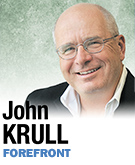Subscriber Benefit
As a subscriber you can listen to articles at work, in the car, or while you work out. Subscribe Now
 Former Indiana Chief Justice Randall Shepard and other veterans of the highest state courts in the country issued a warning a few days ago about the dangers of large-scale campaign spending in judicial campaigns.
Former Indiana Chief Justice Randall Shepard and other veterans of the highest state courts in the country issued a warning a few days ago about the dangers of large-scale campaign spending in judicial campaigns.
There is some irony in that—because it was the U.S. Supreme Court that tore down the campaign finance dam and let money flood elections at every level all over the land.
More on that in a moment.
We’ll let Shepard make his argument first.
Shepard’s comments came as part of his service as a board member of Justice at Stake, an enterprise dedicated to keeping courts fair and impartial. He spoke at a Washington, D.C., conference focused on the release of a new Justice at Stake report documenting that campaign spending almost doubled in the four years between 2007-2008 and 2011-2012.
Much of the money that flowed into state Supreme Court races came from special interest groups with national agendas.
Although the reality that they might lose their jobs for doing something that’s right but unpopular is an everyday reality for politicians, it’s apparently an unwelcome new development for judges. They’re just learning that the flood they unleashed can soak them, too.
That was the bulk of Shepard’s concern.
“Money finds whatever crevice it can, and flows into groups which are less transparent and less accountable,” Shepard said.
He argued that it would be good to limit the roles special interest groups play in judicial elections and give more power back to local parties and candidates. He said that, because parties and candidates are closer to the communities they represent, they likely would take a lot of the negativity and hostility out of campaigning.
All of that is true, but it’s going to be hard to make it happen—in large part because of obstacles to campaign finance reform constructed by U.S. Supreme Court rulings.
More than 30 years ago, the U.S. Supreme Court ruled that money was, in effect, speech and therefore entitled to First Amendment protections.
The trouble was compounded a few years ago in the Citizens United case when the Supreme Court ruled corporations—and that includes special interest groups and political action committees—were, in effect, citizens and entitled to constitutional protections, too.
With the Citizens United ruling, the nation’s highest court tore down the last pieces of the thin and porous wall restraining campaign spending and allowed political money to flow, to use Shepard’s image, into every crevice in the land.
We now live in an America in which presidential campaigns spend upwards of a billion dollars to elect someone to a position that pays $400,000 per year.
But the Supreme Court rulings also have opened the tap on spending on all sorts of other elections, including judicial ones. Controlling that is going to be almost impossible as long as we view money as speech and corporations as citizens.
I don’t know where I stand on campaign finance law. While I see almost daily evidence of the pernicious effect the unfettered flow of money has on our public discourse, I’m also uncomfortable with telling people what they can say or how they can spend their money in support of principles they hold dear.
That said, it is way too late for anyone, least of all members of the judicial branch, to echo Claude Rains in “Casablanca” and say that they’re “shocked, positively shocked” that unchecked campaign spending can have damaging effects.
A flood is what a flood is. It washes over everything in sight.
Including judges.•
__________
Krull directs Franklin College’s Pulliam School of Journalism, hosts the weekly news program “No Limits” on WFYI-FM 90.1, and is executive director of The Statehouse File. Send comments on this column to [email protected].
Please enable JavaScript to view this content.
